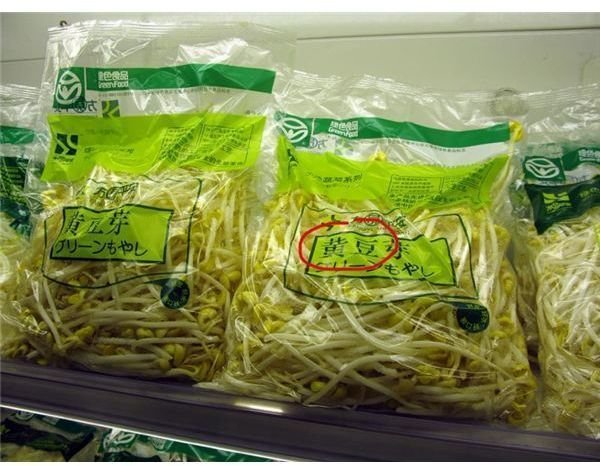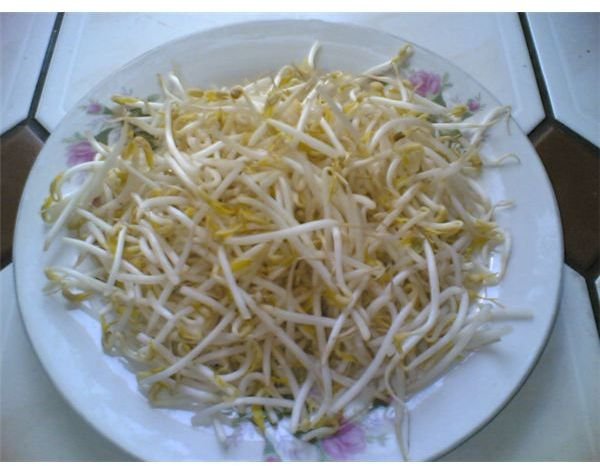Bean Sprout: Nutrition Facts on Mung, Soybean, Lentil, Garbanzo and Adzuki Bean Sprouts
Bean Sprout Nutrition Facts
Most people think of “bean sprouts” as mung bean sprouts. However, the truth is that there are a variety of beans that can be sprouted and they are all very nutritious. Besides mung beans, some of the other nutritious bean sprouts include soybean, lentil, garbanzo and adzuki bean sprouts.
The best part about growing sprouts is that these seeds can germinate within a week and can be grown locally in any season. What’s more, you can grow it in any part of the world. Let’s look at some very interesting nutrition facts on some of the most popular varieties of bean sprouts.
Nutrition Facts for Mung Bean Sprouts
Mung bean sprouts are commonly used in some Asian dishes and should be slightly cooked before consuming. A cup of these bean sprouts provides 26 calories and 2.6g of protein. It also provides you 4% of the daily value of dietary fibers, 4% of iron, 9% of folate and 23% of vitamin C. It is also high in Vitamin K, providing more than 40% of the daily value.
Nutrition Facts for Soybean Sprouts

Soybean sprouts are one of the richest sources of proteins. A cup of these nutritious bean sprouts provide 28% of the daily value, which is twice the amount that you get from eggs and definitely more than what you get from meat. What makes it healthier than eggs is that eggs provide 11% of daily value of fat, whereas soybean sprouts provide only 1/10th of that amount.
A cup of raw soybean sprouts provides 86 calories and 30% of daily value of folate. It is also a rich source of vitamin C providing 17% of the daily value. They also contain phytochemicals or plant compounds that protect against various diseases, including cancers, heart disease and osteoporosis. They also control hot flashes in menopausal women, premenstrual symptoms and fibrocystic breast tumors.
Nutrition Facts for Lentil Sprouts
Lentil sprouts are good sources of thiamin, iron, phosphorus and copper. A cup of these sprouts provide 21% of the daily value of vitamin C, 14% of protein and 19% of folate. These also contain 29.3mg of omega 3 fatty acids and 139 mg of omega 6 fatty acids.
Lentil sprouts can be eaten raw or cooked. Adding these to steamed vegetables and soups will make these already healthy foods more nutritious.
More Benefits of Bean Sprouts
The above nutrition facts on bean sprouts are convincing enough for anyone to make them a regular part of their diet. However, here are some more interesting facts that will convince you further.
Sprouting helps in increasing the vitamins, minerals and proteins in the beans substantially. But that’s not all; it also decreases the number of calories and the fat and carbohydrate content in these beans. This makes sprouts an ideal food for weight watchers.
Since sprouting breaks down the sugars, fats and proteins into simpler compounds, the sprouted form of these beans makes them easy to digest.
Bean sprouts are rich sources of antioxidants, this mean that they protect you from the ongoing damages of aging.
So, now that you know these bean sprout nutrition facts, go ahead and enjoy these very nutritious foods for a long and healthy life!
References
International Sprout Grower’s Association
Sprout People
https://sproutpeople.org/sprouts/nutrition.html
Image Credits:
Wikimedia Commons: Bean-sprouts.jpg
https://en.wikipedia.org/wiki/File:Bean-sprouts.jpg
Wikimedia Commons: Soybean sprouts.jpg
https://commons.wikimedia.org/wiki/File:Soybean_sprouts.jpg
